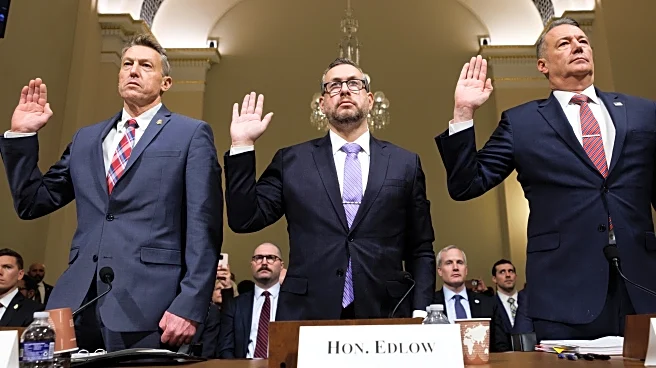Rapid Read • 8 min read
Ukraine's parliament has passed a law reinstating the independence of two key anti-corruption bodies, reversing a previous decision that had sparked significant protests. The initial law, which curtailed the powers of the National Anti-Corruption Bureau (NABU) and the Specialized Anti-Corruption Prosecutor's Office (SAPO), led to widespread demonstrations and criticism from Western allies. President Volodymyr Zelenskyy responded to the backlash by swiftly signing the new law, aiming to resolve the political crisis and reassure international partners of Ukraine's commitment to democratic values. The decision comes amid ongoing Russian attacks on Kyiv, which have resulted in civilian casualties and heightened tensions.
AD
The restoration of the anti-corruption bodies' independence is crucial for maintaining Ukraine's image as a democratic state, especially during wartime. The move is likely to bolster confidence among European allies and international stakeholders who view anti-corruption efforts as vital for Ukraine's integrity and governance. The protests highlighted the public's demand for transparency and accountability, reinforcing the role of civil society in shaping government policy. This development may also influence Ukraine's foreign relations, as Western countries have been vocal about the importance of anti-corruption measures in their support for Ukraine.
With the new law in place, Ukraine's government will likely focus on stabilizing the political landscape and addressing the ongoing security challenges posed by Russian aggression. President Zelenskyy may continue to engage with international allies to secure further support and pressure Moscow for a ceasefire. The anti-corruption bodies are expected to resume their investigations into high-level corruption, potentially leading to significant political and legal ramifications. The situation remains dynamic, with potential shifts in domestic and international policy as Ukraine navigates its wartime challenges.
The protests and subsequent legislative reversal underscore the resilience of Ukrainian democracy, even under martial law. The swift governmental response to public dissent reflects a commitment to democratic principles and the importance of maintaining public trust. This episode may serve as a precedent for future governance challenges, highlighting the balance between wartime unity and adherence to democratic values. The international community's reaction to these developments could influence broader geopolitical dynamics, particularly in relation to Russia's actions and Ukraine's strategic alliances.
AD
More Stories You Might Enjoy












